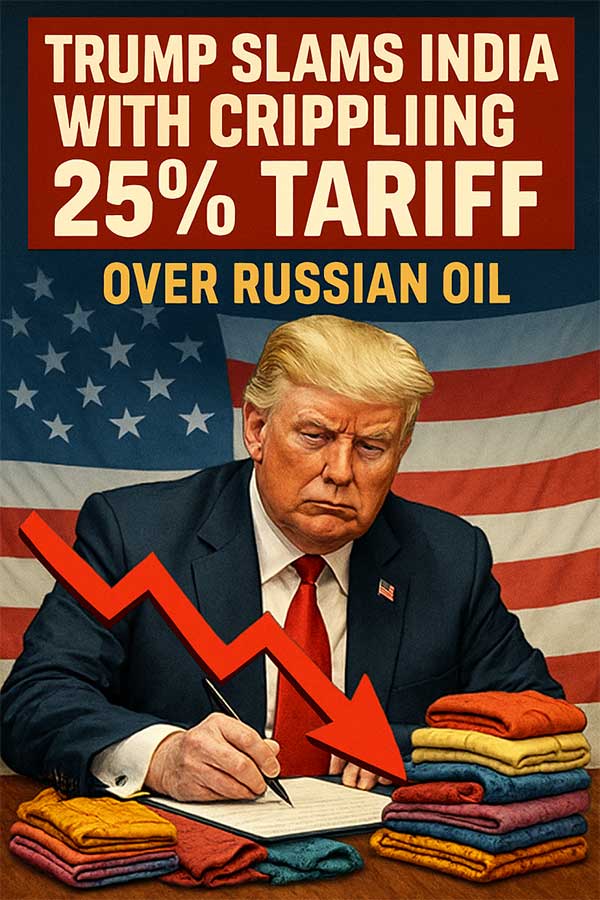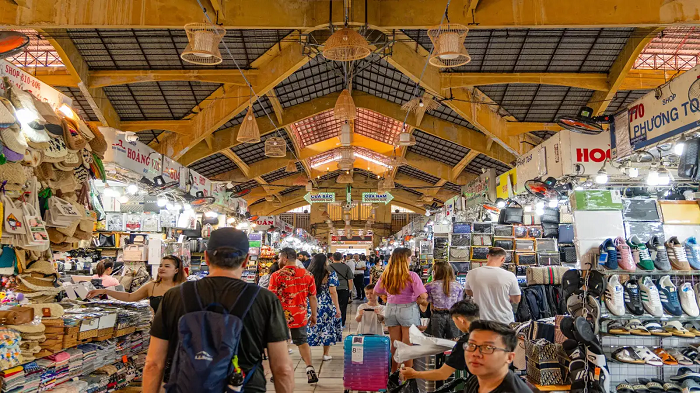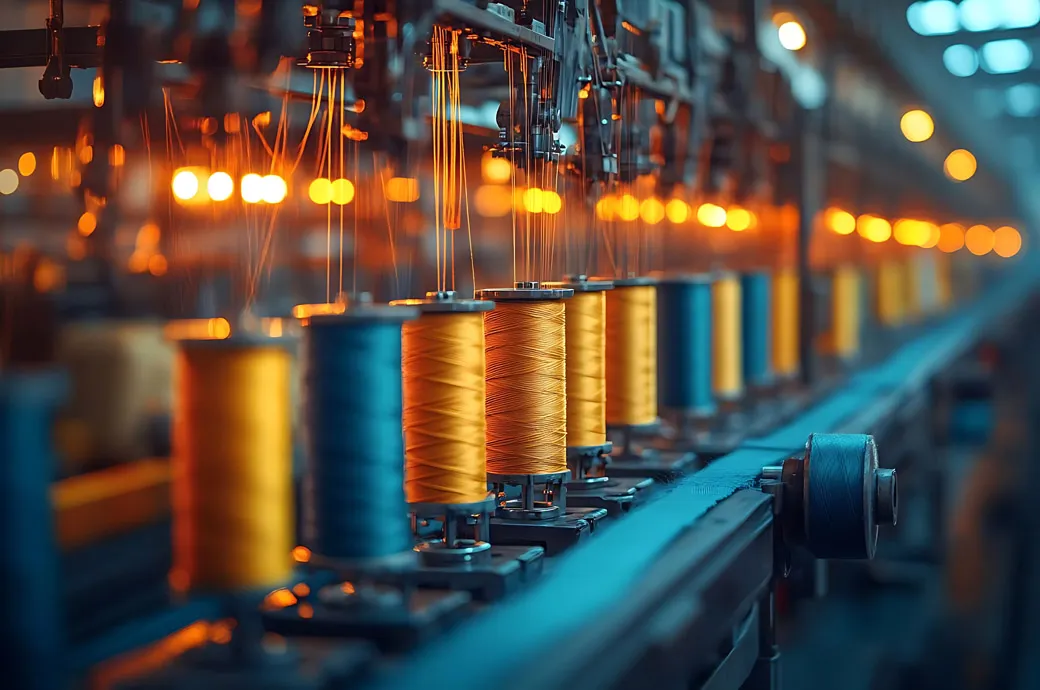FW
Cambodia's manufacturing sector experienced significant expansion in H1, FY25, with 116 new garment factories opening during this six-months period, bringing the total number ogarment factories in the country to 1,682 from 1,566 at 2024-end. driven by strong growth in both garment and non-garment industries.
According to a report by the Ministry of Labor and Vocational Training, this factory expansion coincided with a robust increase in exports. The General Department of Customs and Excise reported, Cambodia's exports of garments, footwear, and travel products (GFT) rose by 22 per cent Y-o-Y to reach $7.38 billion in the H1, FY25.
Garment products were a major contributor to this growth, with exports totaling $5.28 billion, also a 22 per cent increase compared to the same period last year. Imports of raw materials for the garment sector mirrored this trend, reaching $3.49 billion, a 21.43 per cent Y-o-Y increase.
The apparel retail sector is facing significant challenges due to evolving tariff policies and shifting consumer preferences, forcing brands to adjust their strategies to stay competitive. According to a report by GlobalData, companies that can quickly adapt to trends and offer strong value are positioned to succeed, while those that can't may struggle.
GlobalData's analysis points to Adidas as a brand expected to gain market share, thanks to the continued success of its Originals line and performance footwear. The company recently reported a 2 per cent sales growth in the second quarter, demonstrating its strong position. In contrast, Nike is reportedly struggling due to a lack of innovation and the need to streamline its core product lines.
Other sportswear brands, New Balance and Skechers, are also expected to perform well. GlobalData credits their success to product versatility and a strategic focus on high-profile athlete partnerships. In particular, Skechers has been aggressively expanding into new categories like soccer and basketball while signing notable ambassadors, including Harry Kane and Julius Randle. The company also recently made headlines by agreeing to a $9.4 billion sale to 3G Capital.
Despite its continued growth, online fast-fashion giant Shein is seeing its rapid expansion slow down as it matures in the market. The brand's ability to offer low prices and quickly respond to trends still gives it an edge over competitors like H&M and Zara.
Steven Madden’s total revenues increased by 3.4 per cent Y-o-Y to $1.11 billion in H1, FY25 ending June 30, 2025. Despite a rise in gross profit to $452.3 million, the company's net income plummeted to just $2.5 million during the period. This could be attributed largely to a steep increase in operating expenses, which increased from $328.4 million to $441.1 million.
In Q2, FY25, the company's revenue increased by 6.8 per cent Y-o-Y to $559 million. However, its gross profit margin slightly declined to 40.4 per cent, while adjusted gross margin was 41.9 per cent. Operating expenses of the brand increased to 47.2 per cent of revenue, compared to 31.3 per cent a year ago.
This spike in expenses led to a reported operating loss of 7.2 per cent totaling $40.3 million, a sharp contrast to the operating income of $46.9 million reported in the same period last year. The company posted a net loss of $39.5 million during the quarter.
In Q2, revenue from the company’s wholesale business declined by 6.4 per cent Y-o-Y to $360.6 million. Excluding the newly acquired Kurt Geiger, wholesale revenue declined even further by 12.8 per cent. Revenues from the wholesale footwear and apparel business also declined by 7.1 per cent and 5.3 per cent, respectively.
In contrast, direct-to-consumer (DTC) revenue increased by 43.3 per cent to $195.5 million, primarily driven by the Kurt Geiger acquisition. Excluding this, DTC revenue decreased by 3 per cent across both brick-and-mortar and e-commerce channels.
By Q2-end, the company operated 392 retail stores and seven e-commerce websites, along with 130 international concessions. This includes 73 Kurt Geiger stores and two e-commerce sites. Edward Rosenfeld, Chairman and CEO, affirms, the quarter was challenging, largely due to new tariffs on imported goods into the United States. The company is acting with agility to mitigate near-term impacts while focusing on long-term growth, he notes.
The United States has confirmed it will terminate the De Minimis duty-free exemption for all imported goods, effective August 29, 2025. This means that shipments to the US valued under $800, regardless of their origin, will no longer be exempt from duties and customs processing fees. The policy change for goods manufactured in China was already implemented in April.
This change is expected to have a significant impact on international businesses and e-commerce, as it removes a key cost-saving measure for low-value shipments.
After August 29, packages valued under $800 will incur standard U.S. import duties, plus any additional ‘reciprocal tariff’ based on the country of manufacture. Carriers will also add their own customs clearance charges.
For a period of six months, companies have the option to use a temporary flat per-item tariff for postal shipments. The rate will vary from $80 to $200 depending on where the goods were manufactured.
After the six-month period, all shipments will be required to have a full customs declaration and pay the necessary duties, additional tariffs, and shipping fees.
Companies should be prepared to provide additional paperwork to US Customs and Border Protection to prove the origin of their goods.
These changes will require companies that ship to the US to adjust their pricing strategies and logistics to account for the new costs and compliance requirements.
Global apparel retailer Uniqlo is set to expand its footprint by opening of four new stores across Canada this fall. The expansion includes the brand’s first-ever store in Victoria, as well as new locations in Quebec City, Calgary, and Edmonton.
Since launching its first Canadian store in Toronto in 2016, Uniqlo has become known for its innovative LifeWear apparel. This line of clothing is designed to be simple, high-quality, and thoughtfully crafted for everyday needs, constantly evolving to meet modern lifestyles.
The new stores will carry Uniqlo’s full range of LifeWear for men, women, kids, and babies. They will also feature seasonal collaborations and the popular UT (Uniqlo T-shirt) graphic tee collection. Uniqlo’s business model seamlessly combines its in-store shopping experience with the convenience of its online store at uniqlo.com.
With the new additions, Uniqlo will grow its Canadian presence to 37 stores. Globally, the brand operates over 2,500 stores, all committed to its core values of simplicity, quality, and longevity.
In Q2, 2025, the index of orders for textile machinery, compiled by the Economics Department of ACIMIT, the Association of Italian Textile Machinery Manufacturers, declined by a meagre 1 per cent compared to the same period in 2024. In absolute terms, the index stood at 47.1 points (base year 2021=100).
This result was driven by an increase in order intake from the domestic market, which almost entirely offset the decline recorded in foreign markets.
Orders collected on the domestic market rose by 38 per cent compared to Q2, 2024, reaching an absolute value of 70.9 points.
In foreign markets, orders declined by 7 per cent compared to the same period of the previous year. The absolute value of the index stood at 43.8 points.
In Q2, FY25 the order backlog reached 3.9 months of guaranteed production (up from 3.6 months in the first quarter). It is also worth noting that, on average, companies in the sector used only 55 per cent of their production capacity in H1, FY25. Utilization is expected to reach 60 per cent in the H2, FY25.
Marco Salvadè, President, ACIMIT, quips, signals from the domestic market are encouraging, but concerns about the future remain. Demand in Italy is still weak. The increase recorded between April and June will need to be confirmed over the course of the year.”
A general climate of uncertainty persists on the foreign front due not only to US tariffs imposed on the EU, but also to the broader geopolitical situation, adds Salvade. Combined with a significant depreciation of the euro against the dollar, the 15 per cent duty may have varying negative impacts on the firm’s exports to the US, depending on the tariff rates applied to other countries supplying technology to US textile companies.
For now, the US remains a key market for the association’s manufacturers: it was the fourth largest in 2024, with a value of over €112 million, and it continued to grow in the first four months of 2025. Also concerning is the weak demand for textile machinery in the two most important markets, China and Turkey. Italian sales from January to April 2025 declined by 32 per cent in the Chinese market and by 47 per cent in the Turkish one.
A rising innovator in AI-powered sustainability solutions for the fashion and textile industry, GreenStitch has launched a groundbreaking new tool: the Higg FEM AI Gap Analyzer. This free, AI-powered solution is designed to help manufacturers achieve higher Higg Facility Environmental Module (FEM) scores with unprecedented ease, accuracy, and speed.
The Higg FEM is the global standard for facility-level sustainability in the fashion and textile sector. However, many manufacturers find the assessment confusing, often receiving vague feedback and unclear scores without clear guidance on how to improve. GreenStitch's new tool aims to transform this uncertainty into clarity, offering a fast, data-driven path with precise suggestions for boosting their scores.
Manufacturers can simply upload their Higg FEM report and, within minutes, receive a comprehensive AI-powered breakdown. The tool identifies exactly which questions have gaps, what requirements were missed, and provides actionable steps for improvement. A market-first feature, it also predicts the score increase each fix can deliver. For sustainability teams, this means they can prioritize efforts effectively, act with confidence, and prepare for third-party verification without needing expensive consultants or ESG specialists.
Factories today are under growing pressure from brands and regulators to prove their sustainability claims, but they often lack the time, tools, or expertise to act on vague audit feedback, states Narendra Makwana, Co-founder and CEO, GreenStitch. This new AI agent flips the model as it doesn’t just diagnose problems, it shows the exact fix and what it’s worth. This is about moving from compliance confusion to instant clarity.
Unlike traditional support methods that rely on generic feedback or manual consulting, the Higg AI Gap Analyzer is fully automated, aligns with the latest Higg Index v4.0, and integrates seamlessly into existing workflows. It also strengthens alignment with other critical frameworks like ZDHC, CDP, SBTi, and EU CSRD by helping manufacturers improve core reporting data on emissions, energy, water, and chemical management.
From September 23- 29, 2025, Milan Fashion Week will showcase Spring 2026 collections to an audience of celebrities, buyers, and press. This season is particularly notable for several major debuts, with new creative directors unveiling their first collections for iconic Italian houses.
The week kicks off with Glenn Martens' show for Diesel, followed by a highly anticipated moment for Gucci on September 23. Demna, the former creative director of Balenciaga, will present his first collection for the house. It's expected to be a clean, back-to-basics collection that honors Gucci's heritage. Demna's full vision for the brand is slated to be unveiled at Gucci's March show.
On September 24, Simone Bellotti will make his debut for Jil Sander. Based on his pre-show teasers, which included a music video and EP, the designer is expected to present a collection with a musical theme.
The week will also feature Prada in its usual slot on September 25. The day after, on September 26, Dario Vitale will present his first collection for Versace, a show that is planned to be a more intimate event.
The end of the week will see more significant moments. On September 28, Bottega Veneta will begin a new chapter as Louise Trotter, previously of Carven, makes her debut for the brand.
Later that evening, Armani will celebrate its 50th anniversary with a special runway show at the Palazzo Brera in Milan's design district. This major milestone will be preceded by two Emporio Armani shows on September 25.
Multi-brand global leading innovator in outdoor, active and lifestyle products including apparel, footwear, accessories, and equipment, Columbia Sportswear Company has published its outlook for Q3, FY25.
According to this outlook, the company’s net sales are expected to decline by 1-3 per cent to $922 million from $932 million for the comparable period in 2024. Operating margin is expected to decline to 7.6 to 9.0 per cent, compared to operating margin of 12.1 per cent in the comparable period in 2024.
In Q2, FY25, the company’s net sales increased 6 per cent (6 per cent constant-currency) to $605.2 million from $570.2 million for the comparable period in 2024. The increase primarily reflects changes in wholesale shipment timing which benefited sales in the quarter, and higher Spring 2025 wholesale orders, partially offset by lower direct-to-consumer ("DTC") net sales. Sales growth in most of our international markets was offset by underlying weakness in the U.S.
The company’s gross margin expanded 120 basis points to 49.1 per cent of net sales from 47.9 percent of net sales for the comparable period in 2024. Gross margin expansion reflected several factors including healthier overall inventory composition resulting in less clearance and promotional activity, as well as favorable product sales mix, partially offset by unfavorable channel and region sales mix.
Operating loss decreased to $23.6 million, or 3.9 percent of net sales, compared to an operating loss of $23.8 million, or 4.2 percent of net sales, for the comparable period in 2024.
Tim Boyle, Chairman, President and CEO, says, while business trends in the company’s US business remain soft, the company continues to take steps to re-energize the Columbia brand through its Accelerate growth strategy. In the coming days, the brand plans to launch one of the most impactful components of this strategy, their new highly differentiated Columbia brand voice and marketing campaign, he adds.
The Joint Apparel Association Forum (JAAF) has approved the levy of the new 20 per cent reciprocal tariff rate on Sri Lanka’s apparel exports to the United States. The organization praised the Government of Sri Lanka for its determined efforts in securing this favorable outcome, which is considered crucial for the nation's apparel sector.
The revised tariff brings Sri Lanka's apparel industry into closer alignment with other major regional exporters like Bangladesh, Cambodia, Vietnam, Indonesia, and Pakistan. This change creates a more level playing field and helps maintain the competitiveness of Sri Lankan apparel in the key US market.
JAAF reaffirmed its commitment to collaborating with the Sri Lankan government and its US counterparts to promote ethical labor practices, environmental sustainability, and innovation within the industry. The organization believes, these shared values, combined with ongoing diplomatic efforts, will deepen bilateral trade relations and potentially lead to further tariff reductions in the future.












